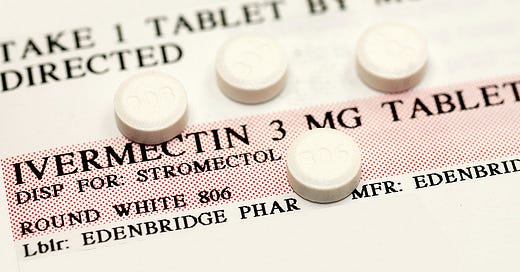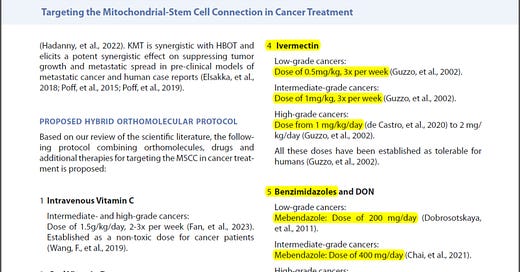
Case Report: Prostate Cancer Stage IV, age 75
Surgery + traditional chemotherapy + fenbendazole
by Ben Fen
Fenbendazole Can Cure Cancer presents Case Reports of people who have treated their own cancers along with other articles to help understand how fenbendazole works to treat cancer. Previous articles covering other cancers are in the Archives link.
The following is a Case Report from a reader who used fenbendazole in addition to traditional androgen blockers post-surgery to help control metastatic prostate cancer that had spread to lymph nodes and bone.
Hello FenBen folks. I just got the results of my still improving scans, and I have been waiting for these before sharing my story. These are the 2 years scans since diagnoses of both a recurred and now stage 4 prostate cancer with wide spread metastases. The 1 year scans were improved, and the 2 year scans are even more improved. I have not actually reached the NED yet, but I seem awfully close compared to the bleak picture 2 years ago. Or even following surgery 10 years ago, when my PSA began it's slow but steady rise after 18 months of being undetectable < 0.01 ng/ml. Here are more details:
I have been waiting to give these results particularly since I added FenBen to my repurposed drug + supplement protocol (and to my prescription anti-cancer drugs) a few months ago. I have been on my other drug cocktail for ABOUT 27 months. I FINALLY added the FenBen a bit over a month before my scans (2 year scans since stage 4 diagnoses and possible turbo cancer). But, my scans were delayed, so I have been including FenBen for 2 or 3 months (sorry, I did not record my exact start date and have forgotten what it was).
The TLDR summary: News not as good as hoped for, still not NED! On the other hand, news is still very good indeed, because not only have I not progressed even a smidgin for 2 years+, I remain undetectable on my PSA for over 2 years AND my scans continue to show regression (opposite of progression ;) .
Regression for the 2nd year in a row. To the point that, with the bone scan, only one spot remains, the original largest one that was on my spine. And it has reduced even further than the reduction from 1 year ago to nowJanuary 9, 2024: “Findings: There is a prominent decrease seen in the focus of uptake in the right aspect of the T12 vertebral body. No new uptake is visualized.” The lesion on my rt. humerus was reduced 1 year ago, and now is no longer even mentioned.
So, 2 years ago, 12/2021, the bone scan showed “There is a tiny focus of intense radiotracer uptake involving the right side of the lower thoracic spine and this correlates with an area of bony sclerosis on the CT scan. A similar focus involves the right humeral head. ….. FINAL REPORT --Impression: There are new bony lesions involving the thoracic spine and right humeral head highly suspicious for metastatic disease”.
12 months later, 12/22: “demonstrate subtle uptake in the right T12 pedicle and corresponds to a sclerotic lesion on CT. Uptake in the proximal right humerus is less conspicuous than on prior study.” (notice T12 has gone from “intense” to “subtle”, humerus is “ less conspicuous”.) Progress!
About 14 months after that, 1/9/24: “Findings There is decrease prominent seen in the focus of uptake in the right aspect of the T12 vertebral body. No new uptake is visualized.” Humerus not even mentioned, and the spine has had a further and prominent decrease. Yay!
That is not NED, but getting much closer each year, so I have to call that very good news. After all, it would not surprise my doctors at all it there was at least a small, or even a large, increase!
So, how about my CT scan? 2 years ago: “There are prominent left periaortic lymph nodes. A representative lymph node (image 87) measures 0.8 cm. This was not seen on previous study. ……. There is development of multiple sclerotic densities noted within the osseous structures. These are seen in the lumbar spine and sacrum as well as the pelvis.”
12 months later: “I see no lymph node… distention. Numerous sclerotic bony metastatic lesions are scattered throughout the lower thoracic spine, lumbar spine and bony pelvis……….IMPRESSION: Stable bony metastatic disease”. (So, no problematic lymph nodes or sacrum mentioned….. improvement!)
Yesterday (January 10, 2024), about 26 months after stage 4 diagnoses, “There are no pathologically enlarged mediastinal, hilar, or axillary lymph nodes…………….No pathologically enlarged retroperitoneal, pelvic, sidewall or mesenteric lymph nodes……….. There is scattered osseous sclerotic foci which are similar to prior CT scan dated 12/2/2022……IMPRESSION: 1. Unchanged osseous sclerotic lesions likely representing prior metastatic disease. 2. No significant change from prior studies.”……………..
The question I’d like to ask the radiologist: when you say : “likely representing prior metastatic disease”, what do you mean by prior? Do you mean a metastatic disease that is no longer there? Are you still looking at unchanged, still living (but at least not advanced) METS, or are you seeing something dead? Scarring left over from what was formerly something rapidly growing? Regardless, I take this as good news, hopefully well on my way to NED.
Did a couple of months of FenBen (which I added to my repurposed drug cocktail which I had already been taking for 2 years), make such a difference? Or did even just taking the drug cocktail for 2 years (even without Fenben), account for a lot of the difference compared to ADT (androgen deprivation therapy) prescription drugs alone?
I’m not sure, but seems likely the FenBen etc. have been a great help. I will continue with FenBen plus the rest of my repurposed drug+supplement cocktail.
Keep in mind: the expected results for the drugs I am on are: "At the first interim analysis, with a median of 22.7 months of follow-up, the percentage of patients with radiographic progression-free survival at 24 months was 68.2% ". There is no mention of how many actually had radiographic evidence of regression. Plus, 15% of the drug group died, compared to 22% of the placebo group, not a huge difference. While my only apparent health issues are side effects from the prescription ADT drugs.
But, at 26 months, I not only have not had any radiographic progression, but rather continue to regress each year. So, Praise the Lord, I must count that as me doing much better than normally expected on these prescription drugs. Are 2 months of FenBen and 2 years of other (hopefully synergistic) repurposed drugs, the reason I am doing so well? Who knows, but a strong "MAYBE". And I am also wondering about what if I had been on the FenBen for the entire 27 months? I do indeed wonder. Here is a link to the study of the prescribed ADT drugs I am on: https://pubmed.ncbi.nlm.nih.gov/31150574/
sincerely,— B. K., Tupelo (birthplace of Elvis), Mississippi, March 4, 2024
Regarding the question you’d like to ask the radiologist regarding the intrepretation of the bone scans…hypermetabolic activity in fenben users whose cancer has been eradicated may be due to bone remodeling/growing back in the holes (lytic lesions) where the cancer used to be in the bones. So keep that in mind. The metabolic signal detected by the tests usually is indicative of cancer when using typical treatment whereas with fenbendazole that same radiologic result can be indicative of a cure in the form of bone remodeling/regrowth. This assessment has been confirmed as a possible scenario by two independent, anonymous radiologists.
Q: How old are you? Weight?
A: 75 years, 205 lb.
Q: How much fenben were you taking? And how many times per day?
A: Honestly, I have been all over the place. As a retired anesthesia provider (CRNA), I have 36 years of thinking in terms of mg/kg for every med that I ever pushed into an IV. Since I weigh a bit over 200 lbs, and Joe Tippens (at 105-115 lb) used 222 mg per day, 3 days on/4 off, I started with 222 mg twice a day, for a total of 444 mg/day. But, I did 7 days a week, except when I would forget or it was inconvenient. I was trying to have this much FenBen added to my normal repurposed drug/supplement cocktail for at least a month before my 2 year scans (2 years since stage 4 diagnoses) which were due about last Thanksgiving. The scans got delayed until this last January. So, I had more like 3 or 4 months of FenBen in me by the time of my scans and my next PSA. More recently, I have reduced to between 222 mg and 300 mg once per day, most days.
Q: Did you notice any side effects that might be attributable to the fenben?
A: Zero so far. My liver enzymes (measured every 3 months) are actually on the low side, and did not increase even 1% - some may have even decreased a bit- since starting FenBen. I have plenty of drug side effects, but they were all present long before I started FenBen. Due to the 2 prescription drugs I am still on, Orgovix and Erleada which wipe out my testosterone. Which sort of wipes me out. If I ever get to 100% NED- rather than the 95% or so per my last scans- I'm really going to push my docs to get me off of these drugs which they want me on for life. But FenBen did not add anything to their unwanted side effects. But unless my PSA begins to increase- it has been undetectable for over 2 years- I probably won't have any more scans until a year passes.
Q: You mentioned you were taking other supplements?
A: I do remember, surprisingly, because the list is long. I have been taking many of the supplements from the time of my original stage 3 diagnoses and surgery 10 years ago, or even before:
1: Vitamin D 5K to 10K per day(depending on lab results) with Life Extension K2 M4 1000 mcg, K2 M7 100 mcg and K1 1500 mcg/day. Magnesium 400 mg/day, Boron 3 mg/day. (Mainly for bone health and anti-viral and general health, but also for possible anti-cancer). Mainly, trying to reduce the chance of the anti-testosterone drugs they are giving me from thinning my bones. Along with their prescription drug Xgeva, seems to be working.
2: Low dose Lithium supplement 5 mg/day(for brain health, but lately has also shown some anticancer traits).
3: Melatonin 1 to 3 mg per night X 20+ years, but raised to 10 to 40 mg per night once I got my stage 4 diagnoses.
4: The following were started a month or so before my stage 4 diagnoses 2 years and 3 months ago: Artemisinin 400 mg per day
5: Loratidine 10 mg per day
6: Cimetidine 400 to 800 mg per night, sometimes alternated with Omeprazole (both anti-heart burn drugs that have shown strong anti-cancer effects)
7: Berberine 500 mg per meal ( as a "natural" substitute for prescription Metformin)
8: High absorption Curcumin(with BioPerine).
9: #s 7 and 8 I had taken on and off before and after the 1st cancer diagnoses in Nov 2013. But I got more consistent with them after my relapse/stage 4 diagnoses.
10: Sometimes, Liposomal vitamin C, particularly when concerned about viruses
11: I really wanted to take Thymoquinone/aka black seed, but it was so nasty I just took it for a few days.
12: Most recently, starting about 5 months ago, I added FenBen to the above. I got in a couple of months use before my last (the 2 year) scans, which had very much improved from the already much improved 1 year scans.
13: Since my stage 4 diagnoses 2 years 3 months ago, I have been on the prescription drugs Orgovix, Erleada and Xgeva. I very much hope to get off of these expensive, side effect riddled drugs.
Q: That’s a lot. What do you think was the most important in your experience?
A: I think all of my drug/supplement cocktails have helped, but I have a feeling that the FenBen has helped the most in the shortest time. But I can't prove it. In fact, I can't prove that all of my improvement did not simply come from the drugs (Erleada/Orgovix). However, my research indicates that is unlikely, both in degree and duration. For example, one study showed "PSA90 response is defined as the patient’s earliest attainment of ≥90 percent decline in PSA relative to their baseline PSA at treatment initiation. At nine months and by the end of follow-up, 70.4 percent of patients treated with ERLEADA® achieved PSA90 and 62.5 percent for enzalutamide (HR=1.49; p=0.024). The median time to PSA90 response was 3.1 months for patients treated with ERLEADA® and to 5.2 months for enzalutamide".
I had a 99.3% drop (from PSA 6 to <.05 ng/ml) in 30 days, and have remained <.05 for 27 months. In addition to my scan improvements, I believe that adds up to a much greater response than normally seen with the drugs alone. "Median treatment duration was nearly three times longer for patients treated with ERLEADA® plus ADT (33 months) compared with the those treated with placebo plus ADT (12 months)". What does that mean? I think it means that the treatment had stopped working by 33 months at median. I am at 27 months. So, time will tell. Also, these drugs I am on had "a 52% reduced risk of radiographic progression (HR=0.48; 95% CI, 0.39-0.60; P<0.0001) for patients in the ERLEADA® plus ADT group vs. placebo plus ADT group after 22.7 months of median follow-up." What I can not yet find out: did any of these patients have actual lasting radiographic regression, for 2 years straight? If so, what %? I would love to know, because I have had exactly that evidence. Is that normally seen with these drugs? I suspect not. I think it is the repurposed drugs, particularly FenBen.
Summary
Congratulations to BK for taking control of his situation and hopefully he’ll be completely cancer-free for many years to come.
We thought BK’s story was especially interesting because of the long time course of his treatment, 10 years+ from his original surgery and that, reading between the lines, one takeaway message is that it is never too late to add fenbendazole to a treatment regimen. BK is correct, when there are many moving parts, traditional chemotherapy, surgery, maybe radiation, it is impossible to know what was the key to remission. What is important is that the cancer seems to have been halted by both radiographic and blood tumor marker (PSA) evidence and that it looks like fenbendazole played an important role in that process.
Additionally, the following may be the most synergistic approach:
New & Improved Joe Tippens Protocol
Tocotrienol and Tocopherol forms (all 8) of Vitamin E (400-800mg per day, 7 days a week). A product called Gamma E by Life Extension or Perfect E are both great.
Bio-Available Curcumin (600mg per day, 2 pills per day 7 days a week). A product called Theracurmin HP by Integrative Therapeutics is bioavailable.
CBD oil (1-2 droppers full [equal to 25mg per day] under the tongue, 7 days a week) https://www.soothingsolutionscbd.com/product/3500mg-full-spectrum-cbd-tincture/
Fenbendazole (300mg, 7 days a week).
Ivermectin (24mg, 7 days a week).
Removing sugars and carbohydrates from one’s diet is crucial during this protocol.
They want you dead.
Do NOT comply.



















As a fellow aggressive prostate cancer survivor (https://cancersurvivor.wf4hl.com/) I applaud your success. There are so many ways to attack this beast. I also applaud your valiant efforts to chart your medical/supplement intake; that is a lot to track. Just a side note, on the black seed oil, I take the capsules in the morning. Anyway, I am 78 as of March 20th but was diagnosed with aggressive prostate cancer in 2010. So far doing pretty well. I lost weight and am down to about 196 but shooting for 185.
I took a much different approach and avoided ANY/ALL traditional crap. I took a nutritional approach and followed a mostly "Gerson Therapy" approach but tweaked it and customized it (https://amzn.to/3tLERky) to suite me.
I have been looking into fenbendazole and sort of keeping it in reserve incase the cancer returns or grows (actually, not even sure it's still there as I haven't really explored it) and have some ivermectin on hand but mostly for the flu.
Again, I applaud your efforts to defeat this horrendous beast, generally known as "CANCER" and wish you well. Hope you keep up the battle and keep everyone (especially me! <grin>) posted. Your success is a wonderful testament to the Fact that Cancer IS CURABLE NOW! But you can't depend on the idiots in traditional medical money industry.
It must be an effective treatment because John Hopkins who co-sponsored Event 201 with the World Economic Forum & Gates of Hell Foundation prior to leaking Covid virus is researching this as treatment using Mebendazole (a related drug) in pancreatic cancer. If the trials show just the slightest benefit it can be brought to the FDA for approval and it would cost big bucks. Very hard to believe there has been little advancement in cancer treatments since Chemotherapy was introduced since the 1950's and maybe before, just too profitable I guess. Products are brought to the market at astronomical prices that often just extend human suffering but do not cure the condition. My sister had Stage 3B lung cancer and went through chemo and radiation treatment only hoping for it to go into remission which it did not. We asked Doctor if it might help to restrict sugar and he said just let her have whatever she wants. That should have been a clue. I looked into alternative treatments but really did not find anything. I sometimes think she may have lasted longer without treatment. It was odd how they first diagnosed her with Mesothelioma but there's the huge class action against Asbestos and they probably did not want to get involved and changed it to lung cancer. They do have more treatments available now then they did 15 years ago but then again I think this just extends the suffering as there was zero quality of life during her treatments.